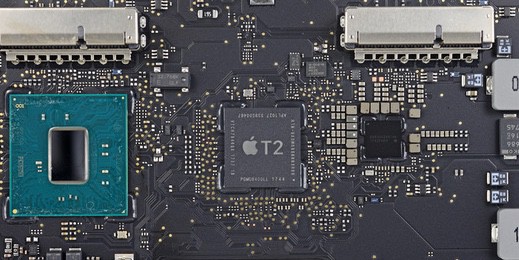Apple has confirmed that certain repairs for its new Macs, sporting the T2 chip, can only be carried out by officially sanctioned Apple repair shops.
That’s because it contains software locks which brick the computers if they’re not operated on by someone not using Apple’s proprietary diagnostic software, called the AST 2 System Configuration. iFixit CEO Kyle Wiens describes this as a “guillotine that [Apple is] holding over” product owners — and potentially third party, unauthorized repairers, too.
News of these changes came out last month when details of a document distributed to Apple’s Authorized Service Providers were shared online.
While this does not stop all repairs being carried out on Macs, they do mean that you’ll likely have to go to either an Apple Store or authorized Apple repair shop if the fault includes your computer’s logic board, flash storage, MacBook top case, and Touch ID board. Failure to do so will result in “an inoperative system and an incomplete repair.”
Apple has now confirmed to The Verge that these details are correct — although it hasn’t provided a complete list of repairs that will involve the AST 2 System Configuration. It also hasn’t revealed which devices are affected or when this policy began (or will begin).
Since it applies to computers with the T2 chip, however, it seems clear that this will affect a growing number of Mac models going forward.
“The T2 is a custom-designed component that performs, among other tasks, processing for Touch ID fingerprint data. It also stores the cryptographic keys necessary to securely boot the machines it runs on. Apple says the chip is critical to new features, too, such as enabling the MacBook Pro to respond to ‘Hey Siri’ requests without requiring you to press a button. It also prevents its laptop microphones from being remotely operated by hackers when the lid of the device is closed. Effectively, the T2 chip is capable of communicating with other components in order to perform some of the most important and sophisticated tasks modern Macs are capable of.”
Right to Repair?
Having earned a terrible reputation for being environmentally unfriendly in the past, Apple today is an incredibly admirable company in this regard. It has taken many proactive steps, such as using recycled aluminum for its new MacBook Air and Mac mini and powering its facilities with sustainable energy. That’s admirable!
However, making its products easy to repair is somewhere Apple falls down. Records show that Apple has spent money lobbying against Right to Repair legislation. Previously, Apple delegates opposed a proposed Right to Repair bill in Nebraska. The company said that giving users and third-party repairers access to Apple components and service manuals would make Nebraska a “Mecca for bad actors.”
Its own repair policies are also sometimes questionable, with some suggesting that Apple overcharges for certain issues. There’s also the controversy about slowing down older devices with software updates and Apple’s tendency to glue components in place, thereby making repairs or upgrades for certain products difficult.
This latest T2 chip issue is just the latest episode in this saga. Hopefully Apple will open up a bit more about exactly why it’s taken the steps that it has. Because right now it’s not a good look for the company at all!


